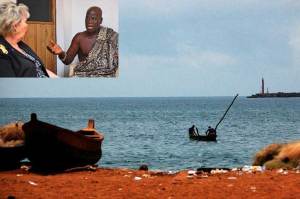AFRICOM “Throwing a rock at a hive of bees”
AFRICOM: “Throwing a rock at a hive of bees”
February 16, 2009 | by Mark Weston | More on Africa, Conflict and security | 7 comments
The US’s new Africa Command (AFRICOM) has made a promising start: its strategic advice to the Ugandan army for its recent offensive against the Lord’s Resistance Army not only failed to defeat the rebels, but resulted in the deaths of over 900 civilians.
AFRICOM – “the culmination of a ten-year thought process within the Department of Defense” – was set up, according to its website, to “help African nations, the African Union and the regional economic communities succeed.” A laudable goal – no doubt drawing on the US army’s great success in helping communities in Iraq and Afghanistan to thrive. “The designers of U.S. Africa Command,” they say, “clearly understood the relationships between security, development, diplomacy and prosperity in Africa.” More…
AFRICOM To Continue Under Obama
With the Obama administration set to oversee significant increases in US security assistance programmes for African countries, Daniel Volman examines the US government’s plans for its military operations on the African continent over the coming financial year. Stressing that the US president is essentially continuing the policies outlined under his predecessor George W. Bush, the author considers the proposed funding increases for initiatives like the Foreign Military Financing programme and the International Military Education and Training (IMET) programme. Pointing out that the administration is yet to offer any public explanation of its policy, Volman concludes that it would be a mistake to assume that there will be no US military action if the situation in Somalia deteriorates.
At the beginning of May 2009, President Obama submitted his first budget request to Congress. The Obama administration’s budget for the 2010 financial year proposes significant increases in US security assistance programmes for African countries and for the operations of the new US Africa Command (AFRICOM). This shows that – at least initially – the administration is following the course laid down for AFRICOM by the Bush administration, rather than putting these programmes on hold until it can conduct a serious review of US security policy towards Africa. This article outlines the administration’s plans for Africa in the coming year and the money it intends to spend on military operations on the continent. More…
Ghanaians Discuss AFRICOM & Obama’s Visit
Posted by xcroc under AFRICOM, Africa command, Ghana, Ghana oil, Gulf of Guinea, Obama, foreign policy, recolonize
[2] Comments
This is something that no one among us has the power to do with our sovereignty. It amounts to the attempted robbery of the nation by the force of arms. In a fundamental matter such as this, that has serious implications on our status as an independent nation, that could even mean life or death to Ghanaians, as we have seen in the bombs that continue to fall on marriage ceremonies in Afghanistan, the minimum expectation ought to have been an open democratic national debate and not secretive and conspiratorial manoeuvres.

TAKORADI, Ghana – A traditional fishing boat sails in the Gulf of Guinea near the fishing village of Takoradi, west of Ghana’s capital, Accra, on March 2, 2009. U.S. Africa Command’s civilian deputy, Ambassador Mary C. Yates, met with local fishermen to discuss ways that maritime security programs can protect fishing stocks, which are a vital source of food in West Africa. Inset: Nana Ekow Akon, chief of the Takoradi fishing community, speaks with U.S. Africa Command’s civilian deputy, Ambassador Mary C. Yates, on March 2, 2009. Yates visited West Africa to discuss international cooperation in illegal fishing, counter-narcotics and illicit trafficking. (Photos by Vince Crawley, U.S. Africa Command)
Nana Akyea Mensah writes in US Military Base In Ghana in response to a feature article on GhanaWeb by Asare Otchere-Darko, Obama’s Visit – What’s In It For Us And U.S.? Otchere-Darko’s article describes and implies that Kufuor did a deal with Bush and General Ward, bringing the Africa Command into Ghana without informing the Ghanaian people.
… in August 2007 Major-General Ward, who was later confirmed as AFRICOM’s first commander, visited Accra. He held discussions with President Kufuor on “ways of strengthening military cooperation.” His high-powered secret meetings with the President, Minister of Defence and the Chief of Defence Staff triggered huge speculation. Much was made of Maj Gen J B Danquah’s public statement about the visit when he said Maj Gen Ward had ‘done enough to resolve’ Ghana’s concerns about AFRICOM, adding, “I have had the chance to hear [Ward] explain what is the reasoning behind the command, and it’s all about partnership.”
This passage is preceded by:
At the moment the Americans say they are happy to keep the U.S. Africa Command headquarters in Germany, to coordinate all U.S. military and security interests throughout the African continent. But any reasonable assessment must conclude that this can be nothing but a temporary address and arrangement. Ghana should welcome that it is thus the target of America’s desire – and we should make the most of this, using it for our own advantage. After all, the process has already started.